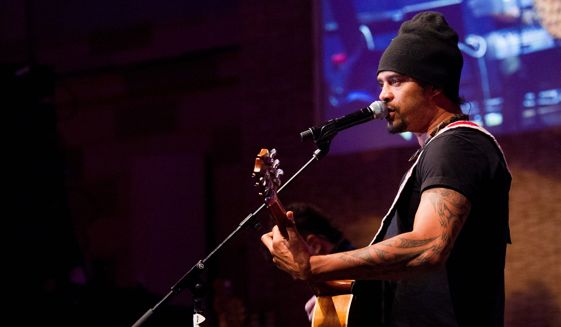|
Taken from Washington Times (May 27, 2015)
Michael Franti: Hip hop ambassador
Michael Franti on his 30 years performing across the globe
by Keith Valcourt — Special to The Washington Times

Michael Franti performs at the Fillmore in Silver Spring on Thursday, June 4. Franti has been playing music across the globe for three decades. (Associated Press) |
Michael Franti is a poet, a political activist and a passionate musician who blends a myriad of styles into a unique stew of rock, pop, hip-hop and folk served with a healthy dose of positivity. His songs are call-to-arms anthems disguised as danceable hippie jams.
In the past three decades, he has toured the globe, playing for everyone from vets to prisoners and Iraqi citizens. His latest tour brings him to The Fillmore in Silver Spring, Maryland, on June 4. Mr. Franti reflects on music as medicine, the unrest in Baltimore and his favorite times in D.C.
Question: Your music has always defied classification because you blend elements of rock, folk, jam bands and hip-hop. How do you classify it?
Answer: I love to write inspiring songs about life. I don’t really subscribe to just one genre. I love to make people dance. I love songs that talk about the transformative process we go through in life when we face problems. I don’t have a word for it. That has probably been a blessing and a curse in my career in music.
Q: When Everlast picked up a guitar he sort of copped your sound, no?
A: Maybe a little bit. Whatever comparison there is I take as a compliment. I really feel like he is on a long journey, just like I’ve been. I think that experience that people have picking up a new instrument and trying to express themselves in a new way changes you. It changed me. It opened my mind in a whole new way to music.
Q: Your songs mix politics with positivity. Is it harder to be positive these days?
A: It is. When I wake up in the morning, I reach for my phone or laptop to see what has transpired over the last eight hours. Usually it’s a [bad] show of garbage — stuff that makes me angry, sad and hurt. When you look at the world, it’s easy to feel frustrated.
Q: With what we have seen in Baltimore and Ferguson, do you feel police brutality is on the rise, or has technology now just allowed us to see the truth?
A: Totally the later. It has only been recently [that] these incidents people see every day on the street have been caught on camera. It’s a wake-up call for the whole country. I think it’s a good.
I think all the dialogue and footage we see are exposing something that has been going on for generations. I liken it to electronic DNA evidence: Technology has reached a point where it is helping to get the truth out. We put out this track “Same as It Ever Was” that is about the police, the violence, tension and killing going on now. Unfortunately, in all my years of making political music, nothing has changed.
Q: Does history just repeat itself, or is there actually a way to effect change?
A: I think history repeats itself until people say “Stop!” Change happens. Right now we are seeing that with the Supreme Court arguing whether there should be freedom for everyone to marry in this country. That is something that even five years ago people found difficult to wrap their heads around.
Q: Do you believe music has the power to heal and transform?
A: Absolutely. I see it every day in the audience when I’m on tour. I see it in my own life. To this day I still reach for my music collection as my medicine the same way some people go to their medicine cabinet for pills.
Q: Any special memories about playing in Washington, D. C.?
A: I have tons of memories from playing the old 9:30 Club to playing in the streets to various protests and rallies. Being there when Obama was first elected and inaugurated.
The overriding thing for me is that D.C. has this subculture of music and people who are not what the rest of the world would think of as residents of America’s capital. Everything from Iraq Veterans Against the War, [which] I’ve been associated with for a long time, to performing at Walter Reed Hospital. [There are] many people of a wide variety of political persuasions and interests in D.C. It is a very unique melting pot of ideas.
Q: You’ve played live in some amazing — and scary — places. Any that stand out?
A: I played on the streets of Iraq 11 months after the war started there. Just took my guitar and played for Iraqi civilians, then played for the soldiers at night. I’ve played Folsom and San Quentin prisons. Played in Gaza on the streets of Israel. I’ve had an amazing life. I still love to play on the streets — the energy that comes from you and your guitar without amplification is the best.
|